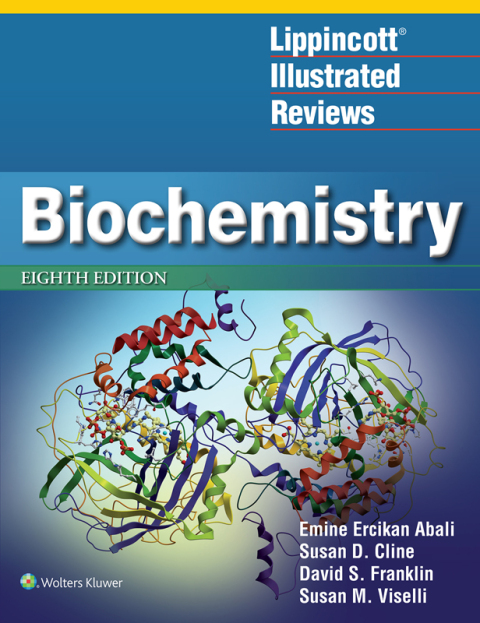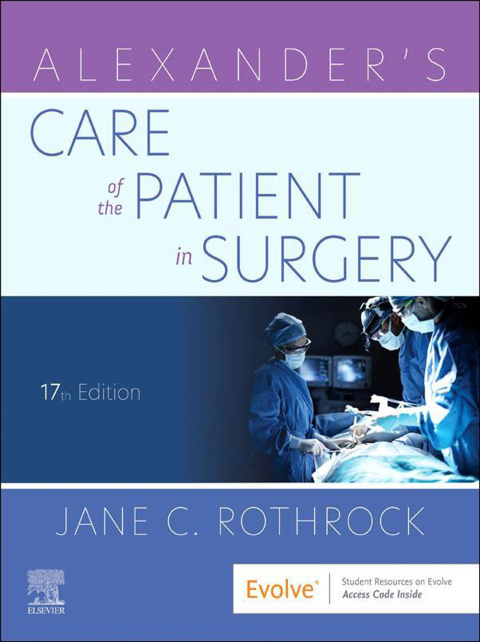Description
Efnisyfirlit
- Cover
- Title Page
- Copyright
- Dedication
- Acknowledgments
- Contributing Editor, Online Unit Review Questions
- Reviewers
- Preface
- Animations
- Contents
- Unit I: Protein Structure and Function
- Chapter 1: Amino Acids and the Role of pH
- I. Overview
- II. Structure
- III. Acidic and Basic Properties
- IV. Chapter Summary
- Chapter 1: Interactive Questions
- Chapter 2: Protein Structure
- I. Overview
- II. Primary Structure
- III. Secondary Structure
- IV. Tertiary Structure
- V. Quaternary Structure
- VI. Protein Misfolding
- VII. Chapter Summary
- Chapter 2: Interactive Questions
- Chapter 3: Globular Proteins
- I. Overview
- II. Globular Hemeproteins
- III. Globin Gene Organization
- IV. Hemoglobinopathies
- V. Chapter Summary
- Chapter 3: Interactive Questions
- Chapter 4: Fibrous Proteins
- I. Overview
- II. Collagen
- III. Elastin
- IV. Chapter Summary
- Chapter 4: Interactive Questions
- Chapter 5: Enzymes
- I. Overview
- II. Nomenclature
- III. Properties
- IV. Mechanism of Enzyme Action
- V. Factors Affecting Reaction Velocity
- VI. Michaelis–Menten Kinetics
- VII. Enzyme Inhibition
- VIII. Enzyme Regulation
- IX. Enzymes in Human Blood
- X. Chapter Summary
- Chapter 5: Interactive Questions
- Unit II: Bioenergetics and Carbohydrate Metabolism
- Chapter 6: Bioenergetics and Oxidative Phosphorylation
- I. Overview
- II. Free Energy
- III. Free Energy Change
- IV. ATP: An Energy Carrier
- V. Electron Transport Chain
- VI. Phosphorylation of ADP to ATP
- VII. Chapter Summary
- Chapter 6: Interactive Questions
- Chapter 7: Introduction to Carbohydrates
- I. Overview
- II. Classification and Structure
- III. Dietary Carbohydrate Digestion
- IV. Chapter Summary
- Chapter 7: Interactive Questions
- Chapter 8: Introduction to Metabolism and Glycolysis
- I. Metabolism Overview
- II. Metabolism Regulation
- III. Glycolysis Overview
- IV. Glucose Transport into Cells
- V. Glycolysis Reactions
- VI. Hormonal Regulation
- VII. Alternate Fates of Pyruvate
- VIII. Chapter Summary
- Chapter 8: Interactive Questions
- Chapter 9: Tricarboxylic Acid Cycle and Pyruvate Dehydrogenase Complex
- I. Cycle Overview
- II. Cycle Reactions
- III. Energy Produced by the Cycle
- IV. Cycle Regulation
- V. Chapter Summary
- Chapter 9: Interactive Questions
- Chapter 10: Gluconeogenesis
- I. Overview
- II. Substrates
- III. Reactions
- IV. Regulation
- V. Chapter Summary
- Chapter 10: Interactive Questions
- Chapter 11: Glycogen Metabolism
- I. Overview
- II. Structure and Function
- III. Synthesis (Glycogenesis)
- IV. Degradation (Glycogenolysis)
- V. Glycogenesis and Glycogenolysis Regulation
- VI. Glycogen Storage Diseases
- VII. Chapter Summary
- Chapter 11: Interactive Questions
- Chapter 12: Monosaccharide and Disaccharide Metabolism
- I. Overview
- II. Fructose Metabolism
- III. Galactose Metabolism
- IV. Lactose Synthesis
- V. Chapter Summary
- Chapter 12: Interactive Questions
- Chapter 13: Pentose Phosphate Pathway and Nicotinamide Adenine Dinucleotide Phosphate
- I. Overview
- II. Irreversible Oxidative Reactions
- III. Reversible Nonoxidative Reactions
- IV. Uses of NADPH
- V. G6PD Deficiency
- VI. Chapter Summary
- Chapter 13: Interactive Questions
- Chapter 14: Glycosaminoglycans, Proteoglycans, and Glycoproteins
- I. Glycosaminoglycan Overview
- II. Structure
- III. Synthesis
- IV. Degradation
- V. Mucopolysaccharidoses
- VI. Glycoprotein Overview
- VII. Oligosaccharide Structure
- VIII. Glycoprotein Synthesis
- IX. Lysosomal Glycoprotein Degradation
- X. Chapter Summary
- Chapter 14: Interactive Questions
- Unit III: Lipid Metabolism
- Chapter 15: Dietary Lipid Metabolism
- I. Overview
- II. Digestion, Absorption, Secretion, and Utilization
- III. Chapter Summary
- Chapter 15: Interactive Questions
- Chapter 16: Fatty Acid, Triacylglycerol, and Ketone Body Metabolism
- I. Overview
- II. Fatty Acid Structure
- III. Fatty Acid De Novo Synthesis
- IV. Fat Mobilization and Fatty Acid Oxidation
- V. Ketone Bodies: Alternative Fuel for Cells
- VI. Chapter Summary
- Chapter 16: Interactive Questions
- Chapter 17: Phospholipid, Glycosphingolipid, and Eicosanoid Metabolism
- I. Phospholipid Overview
- II. Phospholipid Structure
- III. Phospholipid Synthesis
- IV. Phospholipid Degradation
- V. Glycolipid Overview
- VI. Glycosphingolipid Structure
- VII. Glycosphingolipid Synthesis and Degradation
- VIII. Eicosanoids: Prostaglandins, Thromboxanes, and Leukotrienes
- IX. Chapter Summary
- Chapter 17: Interactive Questions
- Chapter 18: Cholesterol, Lipoprotein, and Steroid Metabolism
- I. Overview
- II. Cholesterol Structure
- III. Cholesterol Synthesis
- IV. Cholesterol Degradation
- V. Bile Acids and Bile Salts
- VI. Plasma Lipoproteins
- VII. Steroid Hormones
- VIII. Chapter Summary
- Chapter 18: Interactive Questions
- Unit IV: Nitrogen Metabolism
- Chapter 19: Amino Acids: Nitrogen Disposal
- I. Overview
- II. Overall Nitrogen Metabolism
- III. Dietary Protein Digestion
- IV. Nitrogen Removal from Amino Acids
- V. Urea Cycle
- VI. Ammonia Metabolism
- VII. Chapter Summary
- Chapter 19: Interactive Questions
- Chapter 20: Amino Acids: Degradation and Synthesis
- I. Overview
- II. Glucogenic and Ketogenic Amino Acids
- III. Amino Acid Carbon Skeleton Catabolism
- IV. Folic Acid and Amino Acid Metabolism
- V. Biosynthesis of Nonessential Amino Acids
- VI. Amino Acid Metabolism Disorders
- VII. Chapter Summary
- Chapter 20: Interactive Questions
- Chapter 21: Amino Acids: Conversion to Specialized Products
- I. Overview
- II. Porphyrin Metabolism
- III. Other Nitrogen-Containing Compounds
- IV. Chapter Summary
- Chapter 21: Interactive Questions
- Chapter 22: Nucleotide Metabolism
- I. Overview
- II. Structure
- III. Purine Nucleotide Synthesis
- IV. Deoxyribonucleotide Synthesis
- V. Purine Nucleotide Degradation
- VI. Pyrimidine Synthesis and Degradation
- VII. Chapter Summary
- Chapter 22: Interactive Questions
- Unit V: Integration of Metabolism
- Chapter 23: Metabolic Effects of Insulin and Glucagon
- I. Overview
- II. Insulin
- III. Glucagon
- IV. Hypoglycemia
- V. Chapter Summary
- Chapter 23: Interactive Questions
- Chapter 24: The Feed–Fast Cycle
- I. Overview of the Absorptive State
- II. Regulatory Mechanisms
- III. Liver: Nutrient Distribution Center
- IV. Adipose Tissue: Energy Storage Depot
- V. Resting Skeletal Muscle
- VI. Brain
- VII. Overview of the Fasted State
- VIII. Liver in Fasting
- IX. Adipose Tissue in Fasting
- X. Resting Skeletal Muscle in Fasting
- XI. Brain in Fasting
- XII. Kidney in Long-Term Fasting
- XIII. Chapter Summary
- Chapter 24: Interactive Questions
- Chapter 25: Diabetes Mellitus
- I. Overview
- II. Type 1 Diabetes
- III. Type 2 Diabetes
- IV. Chronic Effects and Prevention
- V. Chapter Summary
- Chapter 25: Interactive Questions
- Chapter 26: Obesity
- I. Overview
- II. Assessment
- III. Body Weight Regulation
- IV. Molecular Influences
- V. Metabolic Effects
- VI. Obesity and Health
- VII. Weight Reduction
- VIII. Chapter Summary
- Chapter 26: Interactive Questions
- Unit VI: Medical Nutrition
- Chapter 27: Nutrition: Overview and Macronutrients
- I. Overview
- II. Dietary Reference Intakes
- III. Energy Requirement in Humans
- IV. Acceptable Macronutrient Distribution Ranges
- V. Dietary Fats
- VI. Dietary Carbohydrates
- VII. Dietary Protein
- VIII. Nutrition Tools
- IX. Nutrition and the Life Stages
- X. Chapter Summary
- Chapter 27: Interactive Questions
- Chapter 28: Micronutrients: Vitamins
- I. Overview
- II. Folic Acid (Vitamin B9)
- III. Cobalamin (Vitamin B12)
- IV. Ascorbic Acid (Vitamin C)
- V. Pyridoxine (Vitamin B6)
- VI. Thiamine (Vitamin B1)
- VII. Niacin (Vitamin B3)
- VIII. Riboflavin (Vitamin B2)
- IX. Biotin (Vitamin B7)
- X. Pantothenic Acid (Vitamin B5)
- XI. Vitamin A
- XII. Vitamin D
- XIII. Vitamin K
- XIV. Vitamin E
- XV. Chapter Summary
- Chapter 28: Interactive Questions
- Chapter 29: Micronutrients: Minerals
- I. Overview
- II. Macrominerals
- III. Trace Minerals (Microminerals)
- IV. Ultratrace Minerals
- V. Chapter Summary
- Chapter 29: Interactive Questions
- Unit VII: Storage and Expression of Genetic Information
- Chapter 30: DNA Structure, Replication, and Repair
- I. Overview
- II. DNA Structure
- III. Steps in Prokaryotic DNA Replication
- IV. Eukaryotic DNA Replication
- V. Eukaryotic DNA Organization
- VI. DNA Repair
- VII. Chapter Summary
- Chapter 30: Interactive Questions
- Chapter 31: RNA Structure, Synthesis, and Processing
- I. Overview
- II. RNA Structure
- III. Prokaryotic Gene Transcription
- IV. Eukaryotic Gene Transcription
- V. Posttranscriptional Modification of RNA
- VI. Chapter Summary
- Chapter 31: Interactive Questions
- Chapter 32: Protein Synthesis
- I. Overview
- II. The Genetic Code
- III. Components Required for Translation
- IV. Codon Recognition by Transfer RNA
- V. Steps in Translation
- VI. Co- and Posttranslational Modifications
- VII. Chapter Summary
- Chapter 32: Interactive Questions
- Chapter 33: Regulation of Gene Expression
- I. Overview
- II. Regulatory Sequences and Molecules
- III. Regulation of Prokaryotic Gene Expression
- IV. Regulation of Eukaryotic Gene Expression
- V. Chapter Summary
- Chapter 33: Interactive Questions
- Chapter 34: Biotechnology and Human Disease
- I. Overview
- II. Restriction Endonucleases
- III. DNA Cloning
- IV. Probes
- V. Southern Blotting
- VI. Restriction Fragment Length Polymorphism
- VII. Polymerase Chain Reaction
- VIII. Gene Expression Analysis
- IX. Gene Therapy
- X. Transgenic Animals
- XI. Chapter Summary
- Chapter 34: Interactive Questions
- Chapter 35: Blood Clotting
- I. Overview
- II. Secondary Hemostasis—Fibrin Meshwork Formation
- III. Limiting Clotting
- IV. Primary Hemostasis—Platelet Plug Formation
- V. Chapter Summary
- Chapter 35: Interactive Questions
- Appendix
- Index
- Figure Sources





